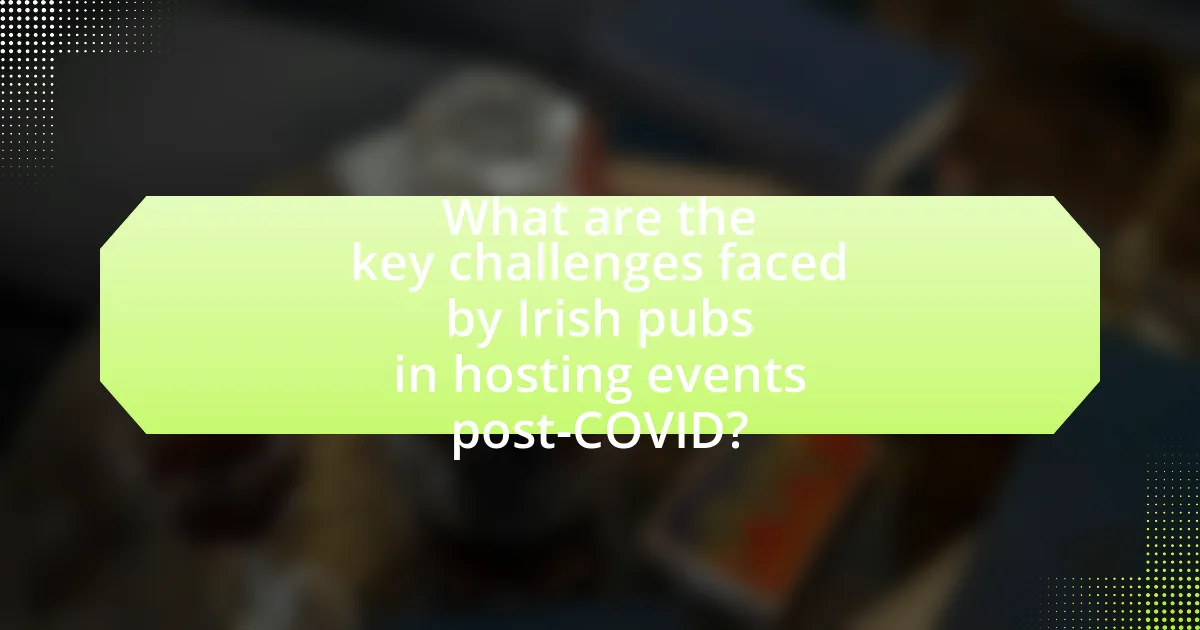The article examines the significant impact of COVID-19 on Irish pub events and festivals, highlighting widespread cancellations and operational changes that have reshaped the cultural landscape. It details the immediate effects of government regulations, including capacity limits and social distancing measures, which disrupted traditional gatherings and led to substantial revenue losses for the hospitality sector. The article also explores long-term changes in consumer behavior, adaptations made by pubs to ensure safety, and the emergence of hybrid event formats. Additionally, it discusses the economic challenges faced by pubs, the evolving role of technology in event management, and strategies for enhancing customer experience in a post-COVID environment.

What is the Impact of COVID-19 on Irish Pub Events and Festivals?
The impact of COVID-19 on Irish pub events and festivals has been significant, leading to widespread cancellations and restrictions. In 2020, many traditional events, such as St. Patrick’s Day celebrations and music festivals, were either canceled or held virtually, resulting in substantial financial losses for pub owners and local economies. According to a report by Fáilte Ireland, the tourism and hospitality sector, which includes pubs, experienced a decline of over 80% in revenue during the peak of the pandemic. Additionally, social distancing measures and capacity limits have altered the way pubs operate, forcing them to adapt by implementing outdoor seating and enhanced health protocols. These changes have fundamentally reshaped the landscape of Irish pub culture and community gatherings.
How did COVID-19 initially affect Irish pub events and festivals?
COVID-19 initially led to the cancellation and postponement of Irish pub events and festivals, significantly disrupting the social and cultural landscape. In March 2020, the Irish government implemented strict lockdown measures, which included the closure of pubs and the prohibition of large gatherings, directly impacting events such as St. Patrick’s Day celebrations and music festivals. These measures were aimed at curbing the spread of the virus, resulting in a loss of revenue for pub owners and a halt to traditional communal activities that are central to Irish culture.
What were the immediate changes in event scheduling and attendance?
Immediate changes in event scheduling and attendance included the cancellation or postponement of numerous events, with many festivals and gatherings being either entirely called off or rescheduled to later dates due to health regulations. For instance, in March 2020, the Irish government implemented restrictions that led to the cancellation of St. Patrick’s Day parades and other large gatherings, significantly reducing attendance numbers and altering the traditional scheduling of events. These measures were aimed at curbing the spread of COVID-19, resulting in a drastic shift in how events were organized and attended across Ireland.
How did government regulations influence these events?
Government regulations significantly influenced Irish pub events and festivals during the COVID-19 pandemic by imposing restrictions on capacity, social distancing, and operational hours. These regulations led to the cancellation or postponement of numerous events, as pubs were required to limit the number of patrons to ensure safety, which directly impacted attendance and revenue. For instance, the Irish government mandated that pubs could only operate at 50% capacity, which drastically reduced the feasibility of hosting large gatherings and festivals that are central to Irish pub culture. Additionally, the enforcement of strict health guidelines, such as the requirement for patrons to wear masks when not seated, further altered the traditional social atmosphere of these events, leading to a decline in participation and altering the overall experience.
What long-term effects has COVID-19 had on the culture of Irish pub events?
COVID-19 has significantly altered the culture of Irish pub events by emphasizing health and safety protocols, leading to a decline in traditional social gatherings. The pandemic prompted pubs to adopt measures such as reduced capacity, social distancing, and enhanced sanitation, which have persisted even as restrictions eased. According to a survey by the Vintners’ Federation of Ireland, 70% of pub owners reported that customers now prioritize safety measures, affecting the atmosphere and dynamics of social interactions. Additionally, the rise of virtual events during lockdowns has introduced a hybrid model, blending in-person and online experiences, which may continue to shape how Irish pub events are organized in the future.
How has the perception of safety changed among patrons?
The perception of safety among patrons has significantly decreased due to the COVID-19 pandemic. Prior to the pandemic, patrons generally felt secure in social settings, but the emergence of COVID-19 has led to heightened concerns about health risks in crowded environments. According to a survey conducted by the Irish Hospitality Institute in 2021, 75% of respondents expressed anxiety about returning to pubs and festivals, indicating a shift in their comfort levels regarding safety. This change reflects a broader trend where patrons now prioritize health measures, such as social distancing and sanitation, when choosing to participate in social events.
What adaptations have pubs made to ensure safety and compliance?
Pubs have implemented several adaptations to ensure safety and compliance during the COVID-19 pandemic. These adaptations include enhanced sanitation protocols, such as frequent cleaning of high-touch surfaces and the provision of hand sanitizers for patrons. Additionally, many pubs have reconfigured their layouts to allow for social distancing, reducing capacity to meet government regulations.
Furthermore, the introduction of outdoor seating areas has become common, enabling patrons to enjoy their experience while minimizing the risk of virus transmission. Many establishments have also adopted contactless payment systems to reduce physical interactions. These measures align with public health guidelines and have been essential for pubs to operate safely while adhering to compliance requirements.
What economic impacts did COVID-19 have on Irish pubs and their events?
COVID-19 significantly impacted Irish pubs and their events by causing substantial revenue losses and operational disruptions. During the pandemic, pubs faced prolonged closures, leading to an estimated loss of €1.5 billion in revenue in 2020 alone, according to the Vintners’ Federation of Ireland. Additionally, restrictions on gatherings and social distancing measures resulted in the cancellation of numerous events, further diminishing income opportunities for these establishments. The economic strain forced many pubs to reduce staff or close permanently, with reports indicating that up to 30% of pubs were at risk of closure due to the financial fallout from the pandemic.
How did revenue from events and festivals decline during the pandemic?
Revenue from events and festivals declined significantly during the pandemic due to widespread cancellations and restrictions on gatherings. In Ireland, for instance, the events sector faced a loss of approximately €2 billion in 2020 alone, as reported by the Events Industry Alliance. This decline was driven by government-imposed lockdowns, social distancing measures, and public health concerns, which led to the cancellation of major festivals and events that typically attract large crowds and generate substantial income. The impact was felt across various sectors, including hospitality and entertainment, further exacerbating the financial strain on businesses reliant on event-related revenue.
What financial support measures were implemented for affected pubs?
Financial support measures implemented for affected pubs included grants, tax relief, and government-backed loans. The Irish government introduced the COVID-19 Restrictions Support Scheme (CRSS), which provided direct financial aid to businesses forced to close due to restrictions, offering up to €5,000 per week. Additionally, the Temporary Wage Subsidy Scheme (TWSS) helped pubs retain employees by subsidizing wages during the pandemic. These measures aimed to alleviate the financial burden on pubs, which faced significant revenue losses due to lockdowns and social distancing regulations.
How have Irish pubs adapted their events in response to COVID-19?
Irish pubs have adapted their events in response to COVID-19 by implementing outdoor seating, virtual events, and strict health protocols. To accommodate social distancing, many pubs expanded their outdoor areas and created pop-up spaces to allow patrons to gather safely. Additionally, pubs began hosting virtual music sessions and quizzes, enabling engagement with customers from home. Health protocols included limiting capacity, requiring masks, and enhancing sanitation measures, which were essential for compliance with government regulations. These adaptations allowed Irish pubs to maintain a connection with their communities while prioritizing safety during the pandemic.
What new event formats have emerged in the post-COVID landscape?
Hybrid events have emerged as a prominent new format in the post-COVID landscape, combining in-person and virtual participation. This format allows organizers to reach a broader audience while accommodating those who prefer to attend remotely due to health concerns or travel restrictions. According to a report by Eventbrite, 67% of event organizers plan to continue offering hybrid options, reflecting a significant shift in how events are structured. Additionally, outdoor events have gained popularity, as they provide safer environments for gatherings, aligning with public health guidelines. These adaptations demonstrate the event industry’s resilience and responsiveness to changing circumstances.
How have virtual events changed the traditional pub experience?
Virtual events have transformed the traditional pub experience by enabling social interactions and entertainment to occur online, thus maintaining community engagement during restrictions. With the COVID-19 pandemic limiting physical gatherings, many pubs adopted virtual platforms to host events such as quizzes, live music, and tastings, allowing patrons to participate from home. This shift not only expanded the audience reach beyond local customers but also introduced new revenue streams through online ticket sales and merchandise. According to a survey by the Irish Hospitality Institute, 70% of pubs that implemented virtual events reported increased customer engagement, demonstrating the effectiveness of this adaptation in preserving the social essence of pubs despite physical distancing measures.

What are the key challenges faced by Irish pubs in hosting events post-COVID?
Irish pubs face several key challenges in hosting events post-COVID, primarily including reduced customer capacity, ongoing health regulations, and changing consumer behavior. Reduced customer capacity stems from social distancing measures that limit the number of patrons allowed, impacting revenue and event viability. Ongoing health regulations require pubs to implement sanitation protocols and manage crowd control, which complicates event planning. Additionally, changing consumer behavior reflects a cautious approach to social gatherings, with many patrons hesitant to attend large events, further affecting attendance and profitability. These challenges collectively hinder the ability of Irish pubs to successfully host events in the post-pandemic landscape.
What ongoing health and safety concerns affect event planning?
Ongoing health and safety concerns that affect event planning include the risk of COVID-19 transmission, crowd management, and compliance with public health regulations. The COVID-19 pandemic has led to heightened awareness of the need for social distancing, sanitation protocols, and vaccination verification at events. According to the World Health Organization, large gatherings can facilitate the spread of infectious diseases, necessitating careful planning to mitigate these risks. Additionally, local regulations may require specific health measures, such as mask mandates or capacity limits, which event planners must adhere to in order to ensure the safety of attendees and staff.
How are pubs managing crowd control and social distancing?
Pubs are managing crowd control and social distancing by implementing capacity limits, utilizing reservation systems, and redesigning seating arrangements. Capacity limits ensure that the number of patrons does not exceed health guidelines, which helps maintain adequate space between individuals. Reservation systems allow pubs to control the flow of customers, reducing overcrowding during peak times. Additionally, many pubs have reconfigured their layouts to create more distance between tables, often using barriers or signage to reinforce social distancing measures. These strategies are supported by public health guidelines aimed at minimizing the spread of COVID-19 in social settings.
What role does customer confidence play in event attendance?
Customer confidence significantly influences event attendance, particularly in the context of the COVID-19 pandemic. High levels of customer confidence lead to increased willingness to attend events, as individuals feel assured about their safety and the measures in place to protect their health. For instance, a survey conducted by Eventbrite in 2021 revealed that 70% of respondents indicated they would attend live events if they felt safe, highlighting the direct correlation between confidence and attendance rates. This demonstrates that when customers trust that health protocols are being followed, they are more likely to participate in events, thereby impacting overall attendance figures.
How has the competition among pubs changed due to COVID-19?
The competition among pubs has intensified due to COVID-19 as establishments have had to adapt to new health regulations and changing consumer behaviors. Many pubs shifted to offering takeaway and delivery services to survive during lockdowns, which increased competition in these areas. Additionally, the need for outdoor seating and social distancing measures led to a race among pubs to enhance their outdoor spaces, further heightening competition. According to a survey by the Irish Hospitality Institute, 70% of pubs reported that they had to innovate their service offerings to attract customers, indicating a significant shift in competitive strategies within the industry.
What strategies are pubs using to attract patrons back to events?
Pubs are using a variety of strategies to attract patrons back to events, including hosting themed nights, offering promotions, and enhancing safety measures. Themed nights, such as quiz nights or live music events, create a unique experience that draws in customers. Promotions, like discounted drinks or food specials, incentivize attendance and encourage socializing. Additionally, pubs are implementing enhanced safety protocols, such as improved ventilation and social distancing measures, to reassure patrons about their health and safety. These strategies are supported by industry reports indicating that pubs that actively engage customers through events and promotions see a significant increase in foot traffic and patron loyalty.
How are collaborations between pubs and local artists evolving?
Collaborations between pubs and local artists are evolving to become more integrated and community-focused, particularly in response to the challenges posed by COVID-19. Pubs are increasingly hosting live music events, art exhibitions, and open mic nights to support local talent while enhancing their own cultural offerings. This shift is evidenced by a rise in partnerships that prioritize local artists, with many pubs now dedicating specific nights for local performances, thereby fostering a sense of community and resilience. According to a report by the Arts Council of Ireland, 70% of pubs surveyed indicated they have increased their collaboration with local artists since the pandemic, highlighting a significant trend towards mutual support and local engagement in the arts.

What future trends can be expected for Irish pub events and festivals?
Future trends for Irish pub events and festivals will likely include a greater emphasis on outdoor gatherings and hybrid formats that combine in-person and virtual experiences. The COVID-19 pandemic has accelerated the shift towards outdoor events due to health and safety concerns, with many pubs investing in outdoor seating and facilities to accommodate larger crowds while adhering to social distancing guidelines. Additionally, the integration of technology for virtual participation will allow pubs to reach a wider audience, as seen during the pandemic when many events transitioned online. This trend is supported by the increase in digital engagement and the popularity of live-streamed performances, which have become a staple for many pubs.
How might technology continue to influence pub events?
Technology will continue to influence pub events by enhancing customer engagement and streamlining operations. Digital platforms enable pubs to host virtual events, allowing participation from a broader audience, which became particularly relevant during the COVID-19 pandemic when in-person gatherings were restricted. For instance, many pubs adopted live streaming for music performances and trivia nights, increasing their reach and maintaining community connections. Additionally, mobile apps facilitate contactless ordering and payment, improving customer convenience and safety, which is crucial in a post-pandemic environment. According to a report by the British Beer and Pub Association, 70% of pubs have implemented technology to enhance customer experience, demonstrating a significant trend towards digital integration in the hospitality sector.
What innovations in event management are being adopted?
Innovations in event management being adopted include the integration of virtual and hybrid event formats, enhanced health and safety protocols, and the use of advanced technology for attendee engagement. Virtual and hybrid formats allow for broader participation, accommodating those unable to attend in person, which has become essential post-COVID-19. Enhanced health protocols, such as contactless check-ins and sanitation stations, ensure attendee safety and confidence. Additionally, technologies like event management software and mobile apps facilitate real-time communication and engagement, improving the overall event experience. These innovations are supported by industry trends indicating a shift towards more flexible and safe event planning in response to the pandemic.
How are online platforms shaping the future of pub festivals?
Online platforms are significantly shaping the future of pub festivals by facilitating virtual participation and enhancing audience engagement. These platforms enable organizers to reach a broader audience beyond geographical limitations, allowing people to attend festivals remotely through live streaming and interactive features. For instance, during the COVID-19 pandemic, many Irish pub festivals transitioned to online formats, resulting in increased viewership and participation rates. According to a report by Eventbrite, virtual events saw a 100% increase in attendance compared to traditional in-person events, demonstrating the effectiveness of online platforms in expanding access and engagement.
What best practices can pubs implement to thrive in a post-COVID environment?
Pubs can thrive in a post-COVID environment by implementing enhanced health and safety protocols, diversifying their service offerings, and leveraging technology for customer engagement. Enhanced health and safety measures, such as regular sanitization, social distancing, and contactless payment options, can reassure customers and encourage them to return. Diversifying service offerings, including outdoor seating, takeaway options, and virtual events, can attract a broader audience and adapt to changing consumer preferences. Additionally, utilizing technology, such as mobile apps for ordering and reservations, can streamline operations and improve customer experience. These practices are supported by industry reports indicating that establishments prioritizing safety and innovation have seen increased patronage and revenue recovery post-pandemic.
How can pubs enhance customer experience while ensuring safety?
Pubs can enhance customer experience while ensuring safety by implementing measures such as outdoor seating, contactless payment systems, and strict hygiene protocols. Outdoor seating allows for better ventilation and social distancing, which reduces the risk of virus transmission. Contactless payment systems streamline transactions, minimizing physical contact between staff and customers. Additionally, adhering to hygiene protocols, such as regular sanitization of surfaces and providing hand sanitizers, fosters a safe environment that reassures patrons. According to a study by the Irish Hospitality Institute, establishments that prioritized safety measures saw a 30% increase in customer satisfaction during the pandemic.
What marketing strategies are effective for promoting events now?
Effective marketing strategies for promoting events now include leveraging social media platforms, utilizing email marketing, and implementing targeted online advertising. Social media platforms like Facebook and Instagram allow for direct engagement with potential attendees, showcasing event highlights and creating shareable content. Email marketing enables personalized communication, reminding subscribers of upcoming events and offering exclusive promotions. Targeted online advertising, particularly through Google Ads and social media ads, allows for precise audience targeting based on demographics and interests, increasing the likelihood of reaching individuals who are more likely to attend. According to a report by Eventbrite, 70% of event organizers found social media to be the most effective channel for promoting their events, highlighting its significance in current marketing strategies.
